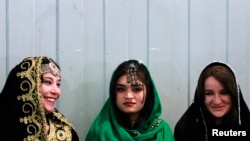LONDON —
Since the fall of the Taliban in 2001, the rights of Afghan have progressed: Women are in school, the workplace and government.
But those advances could well be jeopardized in coming months, according to a new report by the United Nations Committee on the Elimination of Discrimination Against Women (CEDAW).
While CEDAW chief Nicole Ameline has received assurances of Afghan officials that women’s rights will be upheld after international troops depart in 18 months, the U.N.'s most recent gender-inequality index indicates the status of women in Afghanistan remains among the worst in the world.
Ameline fears the progress made on behalf of women’s rights could be lost in peace negotiations — especially with only nine women on the 70-member High Peace Council, the body set up to negotiate peace with the Taliban.
“The situation is absolutely fragile," she said, explaining that warning signs suggest important advances could be reversed. "We know that the next 18 months will be totally crucial for women’s human rights."
According to Monday’s report, Afghanistan also has a "high prevalence of violence against women," including domestic violence, rapes and stoning, and a growing number of attacks on girls' schools by Taliban groups, including instances in which girls have fallen ill because of suspected poisoning.
Elimination of violence act
Afghanistan’s 2009 Elimination of Violence Against Women Law bans forced marriage and rape. Signed as a decree by President Hamid Karzai, the law has yet to be ratified by parliament; just two months ago, parliamentary debate on the legislation was stopped after 15 minutes because criticism was so strong.
While Afghanistan has also enacted electoral law that establishes quotas for women sitting in parliament, this month the proportion of provincial council seats reserved for women was lowered from 25 to 20 percent.
But even if some laws and proposed legislation are still being debated, Marvin Weinbaum, an Afghanistan expert at the Washington-based Middle East Institute, says dialogue about the crafting of new policies is critical.
“They are setting the right standard, what they think are the laws and practices that they would like people to conform to," he said. "At least it sets a goal that can be out there for future leaders to build on."
But he says it is also important to recognize that change is not going to take place overnight — regardless of the legal framework.
"This will remain a patriarchic society," he said. "There are things that they can have only marginal impact on, which are the deeply embedded values in the society."
CEDAW was established in 1982 and is composed of experts on women's issues from around the world.
But those advances could well be jeopardized in coming months, according to a new report by the United Nations Committee on the Elimination of Discrimination Against Women (CEDAW).
While CEDAW chief Nicole Ameline has received assurances of Afghan officials that women’s rights will be upheld after international troops depart in 18 months, the U.N.'s most recent gender-inequality index indicates the status of women in Afghanistan remains among the worst in the world.
Ameline fears the progress made on behalf of women’s rights could be lost in peace negotiations — especially with only nine women on the 70-member High Peace Council, the body set up to negotiate peace with the Taliban.
“The situation is absolutely fragile," she said, explaining that warning signs suggest important advances could be reversed. "We know that the next 18 months will be totally crucial for women’s human rights."
According to Monday’s report, Afghanistan also has a "high prevalence of violence against women," including domestic violence, rapes and stoning, and a growing number of attacks on girls' schools by Taliban groups, including instances in which girls have fallen ill because of suspected poisoning.
Elimination of violence act
Afghanistan’s 2009 Elimination of Violence Against Women Law bans forced marriage and rape. Signed as a decree by President Hamid Karzai, the law has yet to be ratified by parliament; just two months ago, parliamentary debate on the legislation was stopped after 15 minutes because criticism was so strong.
While Afghanistan has also enacted electoral law that establishes quotas for women sitting in parliament, this month the proportion of provincial council seats reserved for women was lowered from 25 to 20 percent.
But even if some laws and proposed legislation are still being debated, Marvin Weinbaum, an Afghanistan expert at the Washington-based Middle East Institute, says dialogue about the crafting of new policies is critical.
“They are setting the right standard, what they think are the laws and practices that they would like people to conform to," he said. "At least it sets a goal that can be out there for future leaders to build on."
But he says it is also important to recognize that change is not going to take place overnight — regardless of the legal framework.
"This will remain a patriarchic society," he said. "There are things that they can have only marginal impact on, which are the deeply embedded values in the society."
CEDAW was established in 1982 and is composed of experts on women's issues from around the world.




